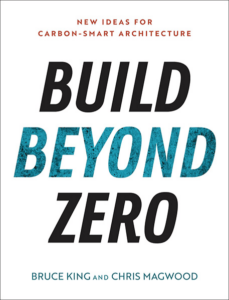Build Beyond Zero: New Ideas for Carbon-Smart Architecture
 “Net Zero” has been an effective rallying cry for the green building movement, signaling a goal of having every building generate at least as much energy as it uses. Enormous strides have been made in improving the performance of every type of new building, and even more importantly, renovating the vast and energy-inefficient collection of existing buildings in every country. If we can get every building to net-zero energy use in the next few decades, it will be a huge success, but it will not be enough.
“Net Zero” has been an effective rallying cry for the green building movement, signaling a goal of having every building generate at least as much energy as it uses. Enormous strides have been made in improving the performance of every type of new building, and even more importantly, renovating the vast and energy-inefficient collection of existing buildings in every country. If we can get every building to net-zero energy use in the next few decades, it will be a huge success, but it will not be enough.
In Build Beyond Zero, carbon pioneers Bruce King and Chris Magwood re-envision buildings as one of our most practical and affordable climate solutions instead of leading drivers of climate change. They provide a snapshot of a beginning and map towards a carbon-smart built environment that acts as a CO2 filter. Professional engineers, designers, and developers are invited to imagine the very real potential for our built environment to be a site of net carbon storage, a massive drawdown pool that could help to heal our climate.The authors, with the help of other industry experts, show the importance of examining what components of an efficient building (from windows to solar photovoltaics) are made with, and how the supply chains deliver all those products and materials to a jobsite. The authors, with the help of other industry experts, show the importance of examining what components of an efficient building (from windows to solar photovoltaics) are made with, and how the supply chains deliver all those products and materials to a jobsite. Build Beyond Zero looks at the good and the bad of how we track carbon (Life Cycle Assessment), then takes a deep dive into materials (with a focus on steel and concrete) and biological architecture, and wraps up with education, policy and governance, circular economy, and where we go in the next three decades. In Build Beyond Zero, King and Magwood show how buildings are culprits but stand poised to act as climate healers. They offer an exciting vision of climate-friendly architecture, along with practical advice for professionals working to address the carbon footprint of our built environment.
Authors: Bruce King and Chris Hagwood
Publisher: Island Press